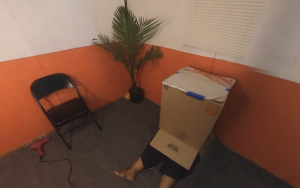
Samuel Miller is a queer filmmaker, writer, and theater artist based in Los Angeles and New York. Obsessed with authenticity, digital environments, and hauntings both literal and metaphorical, Miller’s work deconstructs classic elements of pop culture as well as formal aspects of film and theater to humorously macabre ends. Miller’s full-length video/performance hybrid work, Chambers of Desire premiered at Bard College in 2015 and had its west coast premier at Magnet SF, as part of an anniversary event for Act Up! While attending Bard, Miller curated the Gravitas Theater Festival and premiered three original theater works. He graduated from Bard College in 2015.
Recently Miller spoke with Rebecca Capper about his upcoming work, Foundation for Healing, which is a form of virtual reality therapy that focuses on exorcising the trauma and hyper vigilance that can be caused by living under mass surveillance. Foundation for Healing will premier at We’re Watching this April.
Rebecca Capper: Why are you making Foundation for Healing?
Samuel Miller: My first impulse was to explore what my own relationship to surveillance is and I discovered that I personally don’t value privacy that much, perhaps not as much as I should. That’s what my relationship with surveillance is. My data just doesn’t seem that important to me, and that, I think, comes from a place of extreme privilege. Taking a step back, I asked myself why my first impulse was to tell everyone, “your data doesn’t matter, let it all go free” and it made me wonder why I had this impulse to tell everyone that privacy doesn’t matter. Then it developed into this idea: what if there was some therapy, some organization, where the mission or goal is to dissolve the concepts of personal privacy, technological privacy, and digital privacy. After that, I asked myself: Instead of opening up people’s relationship to data collection, what is the most nurturing thing I could do with this thought, instead of the most exploitative? Then I thought: what if there was an organization that does not reveal all your information, but rather helps you cope with the fact that privacy is somewhat of a myth. The Foundation for Healing works with how to heal yourself in this time, how to come up with something kind and nurturing.
RC: It seems there could be a theme of spirituality, almost verging on religious, in this work. Is that in there?
SM: If there is anything religious it probably is a distortion of what came from my original interview with the performer. Structurally the piece is four separate videos that each represent someone’s self-care routine in relation to surveillance. So, I interviewed all of my performers and asked them about their relationships with surveillance and what kind of self-care routines they practice. After that, I built in elements of fiction, so the performers would not feel as if they were giving away anything too personal. My last work was about narrative, so I wanted to draw back from that and do something more tonal. I wanted to work on visual texture as opposed to story, and that seems to lend a level of spirituality to the piece.
RC: That makes sense. I think sometimes when narrative or language is taken away, and there’s someone just being or existing in an event, it can turn pastoral in some odd way.
SM: Right. I absolutely agree.
RC: How about the role of the viewer and their Virtual Reality (VR) headset? What will they see?
SM: Compliance was a big theme of my research. We are very compliant with our own data, often giving it up to power structures in exchange for god knows what. Every time you click “accept” on a “terms and agreements” page or access a non-secure Wi-Fi network, you’re engaging in this really sinister act of compliance that makes you incalculably vulnerable. My piece starts with a similar act of compliance in which the viewer essentially puts on a blindfold, in this case a VR headset, in a crowded space. By sitting down to watch Foundation for Healing and agreeing to engage with the piece, you’re accepting the fact that you will not know what’s going on around you during the viewing. People will watch you watching the piece since it’s in a very public area, but to engage in Foundation for Healing there is no way around making yourself vulnerable.
RC: Have you worked with VR before?
SM: I have never worked with VR before. This project is the first time and I absolutely love it. It’s the coolest thing. I was quite skeptical of it and then the first video I shot was so much fun. I’m used to 2D filmmaking and I’ve practiced 3D video, but VR is a whole new concept. It takes away everything I know about how to compose a shot or how to light an environment. It all had to go out the door, which left me with a lot room to play around.
RC: What’s it like to be the youngest artist participating in this biennial?
SM: It’s such an honor to be invited to participate in this amazing experience. While attending Bard, I was in love with the Fisher Center and their groundbreaking new programming. So, in becoming a part of that, I feel like I really have to show up with something good. If I were famous, I would phone it in. I’m going to be a total hack some day and love every minute.
Rebecca Capper is a senior in the Department of Theater and Performance, Bard College.
To find out more and to purchase tickets click here.